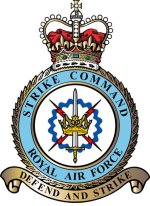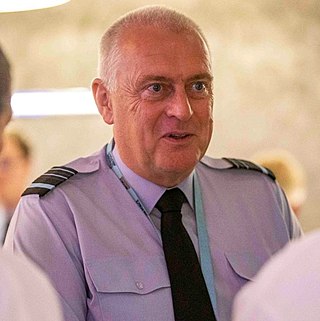Related Research Articles

The Royal Air Force's Strike Command was the military formation which controlled the majority of the United Kingdom's bomber and fighter aircraft from 1968 until 2007 when it merged with Personnel and Training Command to form the single Air Command. It latterly consisted of two formations – No. 1 Group RAF and No. 2 Group RAF. The last Commander-in-Chief was Air Chief Marshal Sir Joe French.

Air Chief Marshal Sir Trafford Leigh-Mallory, was a senior commander in the Royal Air Force. Leigh-Mallory served as a Royal Flying Corps pilot and squadron commander during the First World War. Remaining in the newly formed RAF after the war, Leigh-Mallory served in a variety of staff and training appointments throughout the 1920s and 1930s.

On 2 June 1994, a Chinook helicopter of the Royal Air Force (RAF), serial number ZD576, crashed on the Mull of Kintyre, Scotland, in foggy conditions. The crash resulted in the deaths of all twenty-five passengers and four crew on board. Among the passengers were almost all the United Kingdom's senior Northern Ireland intelligence experts. The accident is the RAF's fourth-worst peacetime disaster.

Air Chief Marshal Sir Wallace Hart Kyle, was an Australian who served in the Royal Air Force (RAF) as a senior commander and later as the 24th Governor of Western Australia. Born in Kalgoorlie, Western Australia, Kyle was commissioned into the RAF in 1929, and, having seen service in the Second World War and the Malayan Emergency, held a number of senior positions, including Vice-Chief of the Air Staff and commander-in-chief of the RAF's Bomber Command and Strike Command. He was made Governor of Western Australia in 1975, a position in which he served until 1980, later returning to England, where he died in 1988.

Air Chief Marshal Sir Richard Edward Johns, is a retired senior Royal Air Force commander. He was a fighter pilot in the 1960s, commanding officer of a squadron during the 1970s and a station commander in the 1980s. Johns served as one of three British directors of operations on the senior planning staff for Operation Granby in 1991 and then acted as a supporting commander for joint operations in the Balkans in 1994. As Chief of the Air Staff he advised the British Government on the air force aspects of the Strategic Defence Review and on NATO's air campaign in Kosovo.

Air Chief Marshal Sir Glenn Lester Torpy, is a retired senior Royal Air Force (RAF) commander. He was a fast jet pilot in the late 1970s and 1980s, saw active service during the Gulf War and then went on to higher command. He was the air component commander on Operation Telic and served as Chief of the Air Staff, the professional head of the RAF, from 2006 to 2009. In that role Torpy hosted the RAF's biggest air display in two decades, and argued for consolidation of all British air power in the hands of the RAF.
Air Chief Marshal Sir Peter Ted Squire, was a senior Royal Air Force officer. He was a fast jet pilot in the 1970s, a squadron commander during the Falklands War, and a senior air commander in the 1990s. Squire served as Chief of the Air Staff from 2000 to 2003. In retirement he was the chairman of the board of trustees of the Imperial War Museum and vice-chairman of the board of the Commonwealth War Graves Commission.

Marshal of the Royal Air Force Sir William Forster Dickson, was a Royal Naval Air Service aviator during the First World War, a senior officer in the Royal Air Force during the inter-war years and a Royal Air Force commander during and after the Second World War. Dickson was Chief of the Air Staff in the mid-1950s, in which role his main preoccupation was the establishment of the V Force and the necessary supporting weapons, airfields and personnel. He also served as the first Chief of the Defence Staff in the late 1950s.
Air Chief Marshal Sir John Romney Day, was a senior Royal Air Force commander and a military advisor to BAE Systems.
Air Chief Marshal Sir John Shakespeare Allison, is a retired senior Royal Air Force (RAF) commander. He was the Gentleman Usher to the Sword of State.
Air Chief Marshal Sir Joseph Charles French,, often known as Sir Joe French, is a retired senior Royal Air Force officer who was the last Air Officer Commanding-in-Chief RAF Strike Command (2006–07).

Air Chief Marshal Sir Harry Broadhurst,, commonly known as Broady, was a senior Royal Air Force commander and flying ace of the Second World War.

Air Chief Marshal Sir Frederick Rosier, was a senior Royal Air Force commander.

Air Marshal Sir Richard Llewellyn Roger Atcherley, was a senior Royal Air Force officer. He served as Commander-in-Chief of the Royal Pakistan Air Force from 1949 to 1951. His final appointment before retiring from the RAF was Air Officer Commanding-in-Chief of Flying Training Command.

Air Marshal Sir Richard Bowen Jordan, was a bomber pilot and squadron commander during the Second World War, a senior Royal Air Force officer during the post-war years and the sixth Commandant of the Royal Observer Corps (1949–51).

Air Marshal Sir Barry Mark North, is a retired senior Royal Air Force officer, who served as Deputy Commander (Personnel) at RAF Air Command. A helicopter pilot, North has held command appointments at all levels, notably No. 78 Squadron in the Falkland Islands, the Special Forces Flight as a squadron leader and the newly established No. 83 Expeditionary Air Group in the Middle East as an air commodore.
Air Chief Marshal Sir William Derek Hodgkinson, was a senior Royal Air Force officer. As a bomber pilot in the Second World War, he was shot down and spent time in Stalag Luft III as "Big S", responsible for the security of the escape committee.
Air Marshal Sir Kenneth Charles Michael Giddings, was a senior Royal Air Force officer who served as a fighter pilot during the Second World War. After retiring from the military, he became an independent panel inspector with the Department of Environment and chaired a number of inquiries concerning motorway expansion.
Air Chief Marshal Sir Robert James Michael Alcock,, usually referred to as Sir Michael Alcock, is a retired senior Royal Air Force commander and an aerospace consultant.

On 8 December 2021, a Mil Mi-17V-5 transport helicopter operated by the Indian Air Force (IAF) crashed between Coimbatore and Wellington in the state of Tamil Nadu, after departing from Sulur Air Force Station. The helicopter was carrying Chief of Defence Staff General Bipin Rawat and 13 others, including his wife and staff. Everyone on board was killed in the immediate aftermath, except Group Captain Varun Singh, who died from his injuries at a hospital a week later.
References
- 1 2 3 4 5 Air Marshal Sir William Wratten KBE, CB, AFC, FRAeS Military Art
- ↑ Air of Authority – A History of RAF Organisation – RAF Home Commands formed between 1958 – 2002 Archived 5 July 2014 at the Wayback Machine
- ↑ Hoon won’t change Chinook decision The Scotsman, 23 July 2002
- ↑ Report from the Select Committee on Chinook ZD 576 dated 31 Jan 02